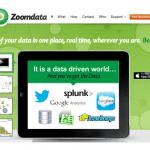It is obvious that the large internet companies like Facebook, LinkedIn or Twitter have many different Big Data solutions. LinkedIn for example employs over 100 data scientists to develop among others the recommendation engine. Twitter developed several open source tools. Also the sentiment analyses or trending topics require a Big Data approach. Facebooks newest search engine … [Read more...] about Will Apple Re-Invent Big Data?
Big Data
Learn everything you need to know about big data. Find out how companies are using this revolutionary technology and what it means for your business strategy.
Could Big Data Spur The Development Of The Semantic Web?
The semantic web, or web 3.0, is often quoted as the next phase of the Internet. Led by the World Wide Web Consortium (W3C), the objective is to convert the current web of unstructured and semi-structured data into a web of data. According to W3C, with the semantic web it will be possible to easily share and re-use data across application, community and enterprise … [Read more...] about Could Big Data Spur The Development Of The Semantic Web?
Ontology Delivers Semantic Search For Enterprise Applications
Company Ontology Address Phoenix Yard, 65-69 Kings Cross Road, London, WC1X 9LW, United Kingdom Founders Leo Zancani & Benedict Enweani Founded January 2007 Funding Unknown Employees 37 Website www.Ontology.com Rating 7 bits Ontology claims to be to applications what Google was to the web. Instead of integrating the many different enterprise applications … [Read more...] about Ontology Delivers Semantic Search For Enterprise Applications
Why a Mere 300 Exabytes In Legacy Data Will Give Us A Headache
Although 90% of the available data in the world was created in the last two years, it does mean that there is still a lot of old data. In 2010 and 2011 we created in total 3 Zettabytes of data. If we use a very simplified calculation, it would mean that the amount of old data is still approximately 0.3 Zettabyte or 300 Exabytes. If we compare that to the 2.5 Exabyte of data … [Read more...] about Why a Mere 300 Exabytes In Legacy Data Will Give Us A Headache
Zoomdata Brings Big Data Visualizations To Your Tablet
Company Zoomdata Address 11950 Democracy Drive, Suite 300, Reston, USA Founders Justin Langseth Founded November 2012 Funding $ 1.1 million Employees 15 Website Zoomdata Zoomdata was launched in the Appstore in February 2013 in Beta. Users that have connected their data will have a birds-eye view of all of their data on their iPad. Users can connect … [Read more...] about Zoomdata Brings Big Data Visualizations To Your Tablet
What is big data?
Big data is a term that refers to the massive amount of digital data created and shared every day. Big data can transform how we live, work, and communicate. It can be used to improve everything from public health and urban planning to business and marketing.
Big data is also changing the way we think about privacy and security. The volume, velocity, and variety of big data present challenges and opportunities for organizations and individuals. Regardless, big data is here to stay, and its impact will only continue to grow in the years to come.
What is big data analytics?
Big data analytics is the process of turning large, complex data sets into actionable insights. Businesses use various analytical tools and techniques, including machine learning and statistical analysis, to do this.
Big data analytics can be used to improve decision-making in areas like marketing, operations, and customer service. It can also be used to identify new business opportunities and optimize existing processes. With the help of big data analysis, businesses can gain a competitive edge by using their data better.
Want to learn more about big data? Datafloq has courses available. Contact us to get started.
When was big data introduced?
The term big data was coined in the 1990s, with some giving credit to John Mashey for popularizing the term. However, the concept of big data has been around for much longer.
Where does big data come from?
In the early days of computing, scientists and businesses began to realize that the amount of data being generated was increasing exponentially. As a result, they began to develop new methods for storing and processing data.
Over time, these methods have become increasingly sophisticated and have played a key role in enabling businesses to make sense of vast amounts of information. Today, big data is used in various industries, from retail to healthcare, and its importance is only likely to grow in the years to come.
What are examples of big data?
One of the most common examples of big data is social media data. With over 2 billion active users, Facebook generates a huge amount of data every day. This includes information on user interactions, posts, and even location data. Analyzing this data can help companies better understand their customers and target their marketing efforts.
Another example of big data is GPS signals. These signals are constantly being generated by devices like cell phones and fitness trackers. When combined with other data sets, GPS signals can be used to provide insights into everything from traffic patterns to human behavior. Finally, weather patterns are another type of big data set. By tracking these patterns over time, scientists can better understand the impact of climate change and develop strategies for mitigating its effects.
How do companies use big data?
Companies use big data in marketing, product development, and customer service. By analyzing large data sets, businesses can identify patterns and trends that would be otherwise difficult to spot. For example, a company might use big data to track customer behavior patterns to improve its marketing efforts.
Alternatively, a company might use big data to improve its products by identifying areas where customers are most likely to experience problems. For instance, big data can be used to improve customer service by finding pain points in the customer journey. Ultimately, big data provides companies with a valuable tool for gaining insights into their business operations.







